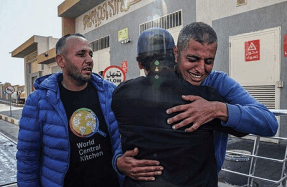The Boston Marathon Bomb Maker Is Still on the Loose

At 2:40 a.m. on June 9, 2013, Sergeant Detective Gary Hayward was dispatched to an address near the center of the tony town of Topsfield, in the North Shore region of Massachusetts. There, he found an elderly woman on a bench outside the town library in her bathrobe, sobbing, her disheveled and distraught companion beside her.
Hayward, a patient man with a calm demeanor honed over nearly 30 years in law enforcement, sat with the woman, Glenda Duckworth, as she described being forced to climb out of her bedroom window to escape her 6-foot-2, 240-pound son, Daniel Morley, after he attacked her, yelling, “Witch, burn in hell!” She said her son snatched her eyeglasses off her face and began melting them on the stove, threw her in a chair and forcibly drew cat whiskers on her cheeks with a marker, and then chased her into her bedroom, where he jumped on top of her longtime partner, David Bloss. As Bloss begged, “Help me, Glenda!,” she climbed out of the window. Bloss wriggled out from under the 27-year-old Morley and escaped out that same window. Together they called 911 from Bloss’s cellphone.
Hayward took copious notes as the terrified couple described Morley’s breakdown, which had been building over the previous eight weeks, since the day two bombs were detonated near the finish line of the Boston Marathon. Morley’s mother had grown so concerned about his behavior that she’d made a psychiatrist appointment for him, which she reminded him of as he assaulted her—“I am your mother, and you need help!”—according to the affidavit she swore out later that day to get a restraining order against him. Her son, Duckworth explained, had long struggled with mental health issues, but since the Boston Marathon bombing, he had become “very dark.”
On the morning of April 15, 2013, hours before the explosions, Bloss told detectives, Morley was helping with yard work when he took a phone call, then left without a word. His behavior made Bloss uneasy, so much so that when the news of the deadly explosions on Boylston Street broke, he asked Duckworth, “Where is your son?”
Morley did not come home for two days. When he did return, he merely told Duckworth he had gone fishing in Maine with a friend.
“His mother was worried,” Hayward recalled during a recent interview with , adding that she was also shocked by her son’s callous reaction to the deadly bombings. According to court records, when Duckworth told her son that some of their neighbors had
You’re reading a preview, subscribe to read more.
Start your free 30 days





